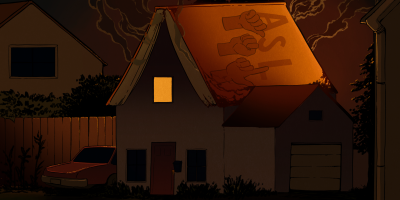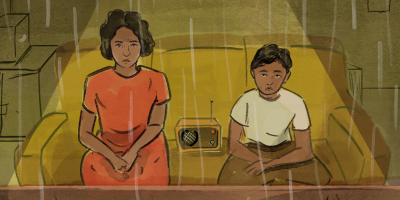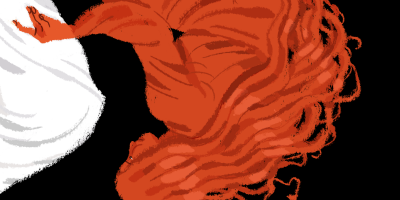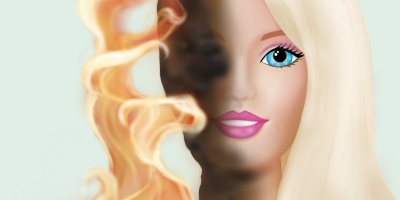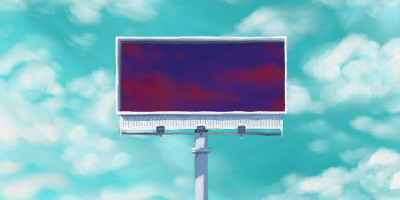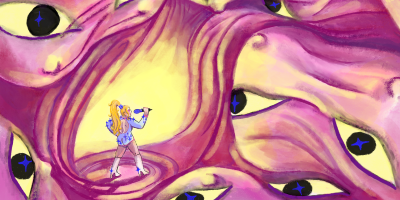Fiction
My Father, the Morning Star
by Rita Chang-Eppig

My father, the Morning Star, believes that each of us is bound to a calling. This calling comes not from God but from something older. It called God to rule the world above and my father the world below, not because my father was not good enough for the former but because God was not strong enough for the latter. “There is an unspeakable burden in being hated by all things,” he once told me. “They call me God’s Adversary, the Father of Lies, as though truth has any meaning in the absence of falsehood. They curse my name, but I carry on. We carry on because we must.”
I was created from my father’s tears, which welled up from the earth and became streams of lava. He chose a droplet of the deepest red and shaped it into a girl. He named me Stella, after the beauty of the stars, for he detested that earthen clod Adam, God’s soiled creation. Succubi, their bellies distended with stolen seed, nursed me on their sharp, sour milk. They lulled me to sleep with songs about the men who have slipped from their embraces. Humans judge my wet nurses harshly, but make no mistake, they mourn the loss of every single man they love. At night, their songs echo in the farthest chambers of the world below, twining and untwining among the lost souls like the serpent forms to which they return at daybreak.
On his throne, my father observed suns collapse under their own weight and then, in time, flare into life again. He guided humanity’s journey from physical to spiritual hunger. Sitting beside him, I listened to stories about all those things, but mostly, I listened to stories about who I would become. When the day came that he could no longer carry his burden, I was to take over his duties: to sow chaos and discord, to poison minds with hate and harden hearts with greed.
“What if I don’t want to?” I asked.
“It is your duty,” he said.
“But if you don’t want to do this either, then why make me?”
He looped one of his curls around his finger. The hair frizzled, fell to the ground, and turned into a pool of quicksand. “There must be pain in the world for people to understand beauty, the same way that anticipation of death gives life meaning. Never forget that our role is equal to God’s.”
We quarreled like this for millennia. Yet he was still my father, and before sleep, he would come and sit by my craggy bed of diamond and salt crystal to stroke my head and kiss me good night. I would watch the ends of my hair roar into flames and then hush into smoke as his lips singed my cheek. He believed, in his heart of hearts, that his daughter would never really disappoint him.
And then one day I told him I wanted to leave.
Carreau, my father’s trusted adviser, locked the gates behind me forever one summer morning. He wrapped me in a hug, his gray flint skin warming and softening ever so briefly from the contact before again becoming stiff as pride. An acid tear rolled off his beak and onto my shoulder. “Take care of yourself, star,” he said. “He’ll come around someday.”
“Tell him I love him,” I said. My father and I had not spoken since my announcement. He had listened to my reasons in silence before rising from his throne and walking away.
“What do you hope to find out there?” Carreau asked.
“Another way to be, perhaps,” I said. “I’m not certain myself.”
He nodded. “Like your father, I don’t believe we can be anything except what we are called to be. But I hope you prove us wrong.”
I traveled in the direction of the sunset without a destination in mind. As I passed them, streams dried to dust, and the ground beneath me shuddered and crumbled. Grazing beasts unexpectedly lay down and ceased their breath at my touch. I grieved for them, pressing myself to their coarse, muddy flanks until nothing remained but bits of bone and scorched fur. Those I saved for nearby revenants, who have whirlpools for stomachs but mouths no wider than a needle’s eye. Their hunger is their only constant, the way tears are the only libation in the world below. I heard once that, in the world above, they drink humanity’s prayers, but how must that taste except like the ghost of a feeling on the tongue?
I passed a whole season just crossing the savanna. “There is so much time in the universe,” my father liked to say. “Perhaps too much for those like us.” Yet he, too, was aging. As a child, I had played by his feet, occasionally glancing up to admire the way the embers played in his dark curls, colored them from within the myriad branches like tropical birds. Then at some point, I’d found myself no longer looking up at him but across. The branches had thinned. The birds had flown.
One evening, as the moon scythed the mountaintop in the distance, I found myself at the edge of a human city. Chatter and noise swarmed the air like gnats. I folded myself into human form. The people looked at me without noticing me, sleepwalking from home to work and then back again. Their briefness shone around them, cosmic light being expressed through their pores as if by some immense pressure within, for one can no more trap light inside a mortal body than inside a jar. With each passing second, these creatures lost more and more of it. Not for the first time, I wondered about God’s intentions—to create life with fragments of eternal light and then to abandon it to death, to leave the living to mourn the dying—when it is the nature of light to be free. I sat down next to an old woman. She was looking forward to her grandchildren visiting in the spring, though her dim form suggested she had only days left. I stood and continued on my way.
In another part of town, young women, their wrists heavy with gems, held their heads high like perches for falcons. One registered me out of the corner of her eye, jumped as if seeing her own reflection in the dark, and then forgot me just as quickly. She sensed my nature, even though outwardly I appeared no more than a ragged girl. Like most humans, she shut me out of her mind, fearing that to acknowledge me was to invite me into her life. Her silken companion, loosening the collar around his knotty, translucent throat, laughed at something he overheard from a passerby. I wanted to break open his skin with my fingernail, to pull out and straighten each skein of nerve and sinew, but I resisted this native impulse.
Around the bend in the street, two vagrants curled on their sides against an entryway. Trash in the wind canopied the sky above them. Something about them made me want to provide succor. Perhaps it was their unbelonging.
My father says we love humanity more than the angels do because we know how we hurt them. One cannot help but love what one kills. The executioner sees, as the blade falls, the criminal’s true face, his every desire and sorrow. The angels view the humans as responsibilities. They feel pity and concern, but they do not feel love.
Moons ago, Carreau told me the story of his time in a once-resplendent, now-forgotten civilization while feeding his wolves flanks of meat he had torn from the damned with his jagged beak. “It was a great land, truly,” he said as the beasts wrestled and nipped at one another. “Buildings tall as the eye could see, more than enough water and food for its people. People from all over traveled there to begin their new lives. But all it took was a wedge, a reminder of their own vulnerability, and they destroyed themselves. I barely had to lift a hand.”
“Do you ever regret it?”
“Regret is a human habit. But I did not rejoice in seeing it go. The people were proud and fatally optimistic. They wore their faith as a child wears a paper crown. But the greater the faith, the greater the pain when one realizes God will not come.”
I walked over to the sleeping vagrants. “Be warm,” I said, wanting to comfort them. They broke into a fetid sweat, their blood roiling with fever. I remembered my father’s words—how soothing the cold wind must feel to these humans now in their fever—but I felt only dissatisfaction. I did not wish to always be the obverse, the umbrage of leaves that parts to reveal the brightness of the sun. I wanted to be welcomed. I wanted to be loved.
When I was younger, my father sometimes brought me along on his visits to the human world. The air, limpid and teeming with itself, stretched into galaxies inside me and filled me with a strange sense of possibility. The world below has no air. There, one feels, simply, eternity. It nibbles on the fingertips and crusts in the eyes. It puddles in the center of one’s being and never dries.
My father wanted me to see the creatures of this world as neither helpless nor powerful but fortunate, as they possessed the very thing we and the angels lacked: choice. He wanted me to understand that only through pain can they choose to become whom they become—one never flies if one never falls. What makes them like that, no one can say. Maybe it is in the air they breathe.
Once, my father took me to a glorious city on the eve of its burning. He smiled at me as he fanned the flames to trace the shape of a star over the city. Around us, the humans cried and held one another. Some prayed. Others cursed our names. Still others pulled their neighbors from wreckage or left their families to die. “Watch how they reveal themselves,” my father said, guiding my eye. “Watch how they rise or fall. Frailty is not a fate we force upon them but a decision they make.”
One by one, the souls were released by the flames like long-dormant seeds. With a crook of my father’s finger, the ones that had earned eternity in the world below floated near and clung onto me as burrs to a wolf stalking through a forest. “And this is for you,” my father said, squeezing my hand as he bestowed each soul like a gift, a toy with which I could choose to play. “And this is for you. And this is for you.”
Five moons had waxed and waned by the time Carreau came to me. “He desperately awaits your return but will not admit it,” he said. “Pride was always his essential state.”
“How is he?” I asked.
“As you are aware,” Carreau said, “none of us escapes decay, not even God. But there is the decay of stone, and then there is the decay of the mayfly.”
Guilt thrummed inside me—I tried to still the feeling by placing a hand over my center as one might still a plucked string by alighting a finger upon it. Surely my father simply needed time to adjust. I said as much to Carreau, who shook his head. “Everything is different at home now, star. I have no desire to end your quest, but I thought you should know what was happening.”
Carreau bid me farewell and plodded away, his spindly legs trembling under the weight of his beak. Long ago it became too heavy for him to move comfortably. With every civilization he destroyed, it grew, as if in penance.
I couldn’t help but feel I had broken a promise, one I had unwittingly made by coming into being. My father just needed time to adjust, I repeated to myself. “Be well,” I whispered to the wind, which puffed itself up and then blew itself out like a child making a wish on a candle.
In the dregs of the city, I crossed paths with an archangel. His tall, nacreous form beaconed from amid the shanties. Large pearls, each heavy enough to possess its own gravitational pull, orbited his neck. “I am Sachiel, of the Cherubim,” he said.
“Stella, daughter of the Morning Star,” I said.
He looked perplexed. “Have you come for someone?”
“I’ve come only for myself.”
I followed Sachiel into a shanty, watched him pass his hands over a birthing woman. The child inside her righted itself, and the midwife, her forearms slick with amnion, delivered the screaming creature into daylight. “Thank the Lord,” the midwife said to the mother, who lay half-conscious on her threadbare cot in a pool of red-brown blood. Light swarmed from her like honeybees leaving a hive. Seemingly uninterested in helping the mother, Sachiel withdrew from the room, leaving the midwife to her paean. Her praise filled my mind and coated my skin like an attar of the sweetest blooms. Was this how it felt to be from the world above, to be constantly loved? I hated Sachiel and his kind in that moment. I also hated the humans, though my father had always taught me to forgive their ignorance. Sensing their loss of light, they desperately seek restoration, which is why from their earliest days they have raised their hands to the sky and worshipped the sun as God, God as the sun, all the while regarding the stars as an inferior form of illumination. But where would humanity be without the stars to help them navigate, to mark time, to inspire the tales they pass on to their grandchildren and beyond?
The mother roused slightly at my approach and, to my greater surprise, started praying to me for her child’s health. I needled further into her mind as if to find a vein: in her delirium, she’d mistaken me for an angel.
“I will try,” I said.
Rippling over to the child, I raised my left hand and touched the index and middle fingers to his blood-anointed brow. What little light had been left inside her swarmed into him. The mother shuddered and stilled.
“I’ve never known your kind to answer prayers,” Sachiel said from behind me.
“This isn’t what she meant. She wanted to watch him grow up.”
“What are a few decades in the scheme of things? Dying is what these creatures do best.” He said this as if living were something our kinds did well. “I must be going now. Join me if you wish.”
Sachiel did not ask why I had left the world below, and I did not offer the information. We simply journeyed in tandem. Like most of the other angels, he travels unseen, for to be visible is to invite supplications, and always too much needs to be done. Instead, they move in the space between humans’ heartbeats, faster than lifeblood, at the speed of hope. I had encountered only one angel up close before Sachiel. A messenger had visited the world below. His skin was gold and mirrored the scene around him, transforming all of us into misshapen effigies of ourselves. He winged from place to place with an air of distaste at the blackened, crooked incisors of stone, at the mangy hounds rolling around in the volcanic ash. His feet never touched our ground. I cried for thirteen moons afterward, though I never told anyone why. The truth was I’d felt ashamed to have the angel, with his crown wired from sunlight, see the lesions in the walls. I’d recoiled from the reflection of my own skin, the color of venous blood.
Sachiel hurried from task to task, utterly unaffected by the praise of the humans. Finally, he turned to me. “Do you miss home?” he asked.
“I miss my father and my friends,” I said, “but there’s nothing to miss about the world below.”
“How funny,” he said. “I can think of nothing but returning home.”
In the world above, he explained, joy condenses in midair as dewdrops. One can palm a droplet and swallow it like a song for which one lacks the words. “The joy becomes you and dissolves you,” he said. “Every time we leave, we feel that joy cleaved from us. We become ourselves once again.”
“So why not beg to stay, if leaving is such torture?”
He shook his head. “How does one refuse one’s creator? God’s work here must be done. But there is a village deep in the mountains where the people have ceased believing in us. They understand sorrow and joy to be inseparable companions. They leave their dead under the sun to feed the birds. Who knows? Perhaps one day these creatures will grow beyond the need for us.”
“It doesn’t seem so terrible,” I said. “You may be leaving joy, but you find love in its place.” To someone unloved, being too loved seemed a luxury. My friend Ukobach had been the first of us to break. He could not accept being universally hated. Now he spends his days chained in a forgotten corner of the world below, picking at the boils erupting from his skin. From each, he extracts a tiny beating heart that he then tosses into a fire to destroy. He wishes to cleanse himself of feeling. To some extent, all of us from the world below want to cleanse ourselves of feeling.
“Love implies separation,” Sachiel said. “There is the lover and the beloved. Humans often believe that they can find oneness in love, that they can obliterate the space between them, but it is inherently impossible. What use does my kind have for love when we already know where to find oneness?”
It was a strange thought, that no amount of love could equal the joy of oneness with God. I wouldn’t have guessed that the angels hurt in their own way, but it made sense. Having experienced only joy in the world above, they were not ready for the sadness that inhabited the rest of the universe. They could not have imagined the sense of loss they would feel at leaving that joy behind.
My father does not suffer as the rest do, but he still suffers. The suffering is rare and fleeting but exquisite. If one blinks, one misses it and must therefore conclude that he never suffers at all.
The night before I left, an unnatural silence had prickled me awake. I wandered into the Great Hall, and there my father sat on his throne, unmoving. His gnat-eaten black wings, which in a certain light still displayed some of their former luster, hung heavy from his suddenly-too-small frame. His countenance, normally so incandescent, was cool and dull as stone. “Father,” I said. He did not respond. I realized then that, when he felt overburdened by his terrible responsibility, he knew no other way to be. I wanted to shake him. “Why can’t we just abandon the throne?” I wanted to scream. But I could not muster the courage.
I wasn’t able to explain it when I announced my decision to him, but I had seen my future in that moment. Faced with such a destiny, what could I have felt but terrified? What could I have done but run?
With Sachiel, I journeyed from fetid jungles to fog-soaked peaks. Everywhere these humans thrived, so hardy and yet still so full of need. Fall blanched into winter, which in turn blushed into spring. One day, a cacophony of prayer drew us to a camp at the edge of a desert. Under the low-hanging sky, the bony shacks of the camp cowered like mollusks. From within them we heard the heartbeats of hundreds skipping, slowing, stopping. They lay in their own waste, limbs rendered useless by weapons or by atrophy. The smell was sour, pitchy, like a beast decomposing in tar. A war about greed, as all human wars are, glossed up as a war about God. Carreau had done his job well.
My eyes burned from all the light. I pressed my ear to the heart of a girl on the cusp of summer and heard between each beat the rush of waves. Some of the prisoners begged for rescue, others for release from this world. Sachiel moved from person to person, easing pain as best he could. Some of the humans sensed his presence. They sagged toward him or sighed in their sleep. A child’s eyes shot open. “Mama!” she screamed, but the old woman next to her tugged at her sleeve and shushed her. The child prayed: I want my mama, please, I just want to see my mama, can you hear me, God, I’m sorry I hit my brother, I won’t ever hit anyone again, please let me see my mama.
A desperate expression passed over Sachiel’s face, and for a second he appeared not one of the angels but one of us from the world below, born of grief and regret instead of glory and light. In such a place, he had little power. The rules that had been established eons ago forbade us from undoing the actions of the other side. Meanwhile the child’s frantic prayer continued. Sachiel touched a finger to her temple, and she fell back asleep. The prayer stopped.
“They plead and plead for what we cannot give,” Sachiel said, “and every moment we hear them. You cannot imagine it. Perhaps you have been told that angels do not feel for humans, when it is more accurate to say that we must not feel for them. If we did, how could we walk among them and perform our duties? How could we continue to praise God’s grace?”
I saw clearly then the eternal pageant: our actions toward the humans kept them in need of us, and their need of us kept us acting our parts, no matter how much pain it caused us all.
How was I supposed to accept this poisoned mantle from my father? And yet, how was I supposed to let him continue in agony for the remainder of his days?
The creatures before me needed more than the temporary relief that Sachiel offered. I wanted to end their suffering for good, but I was also being selfish. If I could bestow upon them this gift, I thought, then perhaps they would finally love me.
I drew close to a young man whose bruised skin stretched tight across his clavicles and ribs like a strange butterfly. He was praying for himself and for his lover, whom the soldiers had taken away. “Go in peace,” I said.
He opened his eyes. And saw us. I could see Sachiel and myself through him, the one as iridescent as his pearls, the other a red teardrop of a girl. The young man coughed up a bitter laugh like phlegm. And then his mind closed to me.
Rising from his place against the wall, knock-kneed and unsteady, he smashed his head into the wall. Again and again he did this, until bone peered through skin and blood cloaked his shoulders. The people around him whimpered and tugged at his pant legs, afraid to draw the attention of the guards but too weak to stop him. Finally, he fell. His light was a comet crashing skyward.
Sachiel swooped over, visibly shaken. “What happened?”
“He was in so much pain.”
“But his mind! How did he hide his thoughts from us like that?”
I felt just as confused. The man had seen us, really seen us, but instead of pleading for our help, he’d decided that we weren’t worthy of his faith. And who could blame him? We couldn’t even save ourselves.
Sachiel sighed and passed his hands over the man’s body in benediction. I couldn’t tell if he was sad, relieved, or a little bit of both.
Sachiel and I parted ways after that. The events at the camp had left me with no uncertainty that my father was right. I could not even grant the humans peace in death. All I had wrought was faithlessness.
Thus I found myself at the gates of the world below again. Carreau was nowhere in sight. My hand hovered over the familiar knocker of a many-rayed sun partially eclipsed by a dangling copper ring. Somehow it had frosted over. In fact, my very surroundings felt cold, as if a star had burned up all its fuel. “I’m sorry,” I wanted to say to my father. “If we truly have nothing else besides our fates, then we should at least be together.” But a primitive fear seized me. Had my father already disappeared into the beyond, that place neither ours nor the angels’? I couldn’t bear to find out, yet I couldn’t think where else to go.
I remembered the village of which Sachiel had spoken. I decided to see for myself this other kind of faithlessness, one born of conviction instead of tragedy.
Nine moons passed before I found it. I haunted jungles, paced through labyrinths of stone and glass, and lay under skies cracked like eggshells by lightning. I set dark woods aflame and traced the smoke in the shape of a star, hoping that my father would notice and understand that, however selfish my actions seemed, I was doing this for the both of us.
The village bloomed in the crack between two mountains, a bouquet of simple buildings in ochre, yellow, and white. The streets smelled of fog and rain-drunk, manure-fattened soil. The men wore rough tunics and round, voluminous hats with cratered centers for carrying heavy urns. The women twisted their hair into plaits, each with a streak of kohl smeared across her forehead like a diadem. Young lovers batted their eyes at one another. A fight inside a bar boiled over into the streets. Children sang, cried, climbed, fell, giggled, and spun.
It was a village like every other, except I could not read anyone’s thoughts. Together, their minds were patches of color like the sky at the seam of day and night.
My attention turned to the large gathering of people at the edge of town, on the path leading out of the valley. The sound of slow drums reverberated from the center. They were dressed like all the other villagers, except they had shorn their hair to the root. Now and then came the sound of sobbing, but never the sound of prayer. Sturdy men circled an ornate wrought-iron bed, on which lay an old woman who had died recently. I approached in human form.
One of the mourners at the rear of the crowd turned to me. She had a fringe of gray hair at her right temple like a seashell cupped over the ear. “Are you a traveler?” she asked.
My surprise at being acknowledged stopped me from answering for a moment. “Just passing through,” I said. “Will you really be leaving her to the birds?”
“It’s only fair,” she said. “The birds fed her while she lived.”
“Aren’t you afraid she’ll take offense?”
“The dead can’t take offense.”
“So you won’t be praying for her? At her?”
She gazed at me in bafflement. “For what purpose? Prayer doesn’t change reality. Belief doesn’t take away the pain.”
“You may participate in the procession,” she continued, “but we ask that you not leave halfway through, out of respect for our tradition.”
The drums stopped and the villagers began to move. They threw back their shoulders and heads and formed a procession out of town, their baldness scintillating, almost in defiance, as they emerged into the sun. I had the sense they would evaporate.
We arrived on a hilltop. The men at the fore set the woman in her small bed onto the ground, their warm, pale breaths shrouding her. All around, the other dead dreamed their dreams, some on robust mahogany frames and some in peeling cradles, some pristine and some pecked raw by crows. Above, the sky spilled and spread.
I thought about my father alone on his throne, about my friend and his thousand burning hearts. I thought about how I had envied Sachiel, who had found in the love of humans a different kind of pain, for love and need are no more separable than twin stars bound by each other’s gravity. Being stripped bare by carrion birds is a mercy compared with all else, I realized. Burial is the deepest cruelty.
We had been going about it wrong. Believing our work to be the counterpoint to God’s, we stormed discord and chaos upon the humans, earning nothing in return except their hatred. But what they needed wasn’t pain. What they needed was someone to whisper doubt in their ears, as if diverting a gentle stream into the mind. The doubt would swell in time to become faithlessness, a wide river to free us from them, and them from us.
“It’s all right, you can go now,” the woman said to me. For a second, I wondered if maybe she could hear my prayers.
